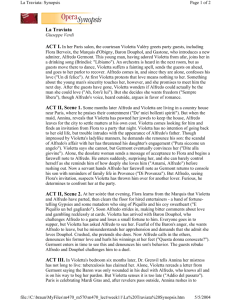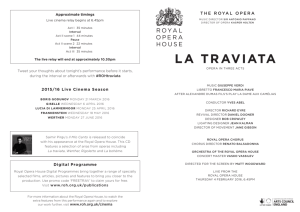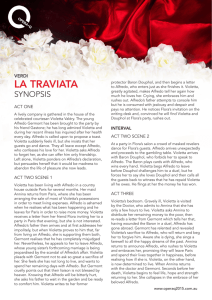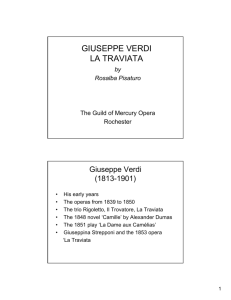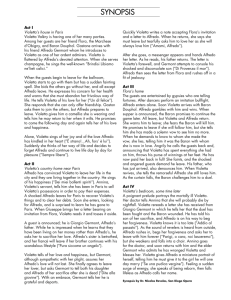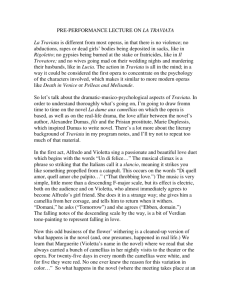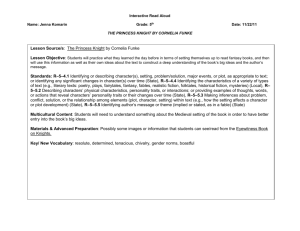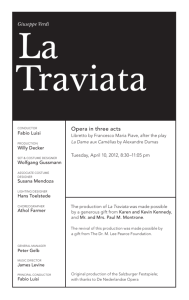INFORMATION PRODUCTION Title: La Traviata from Verdi – Scala
advertisement
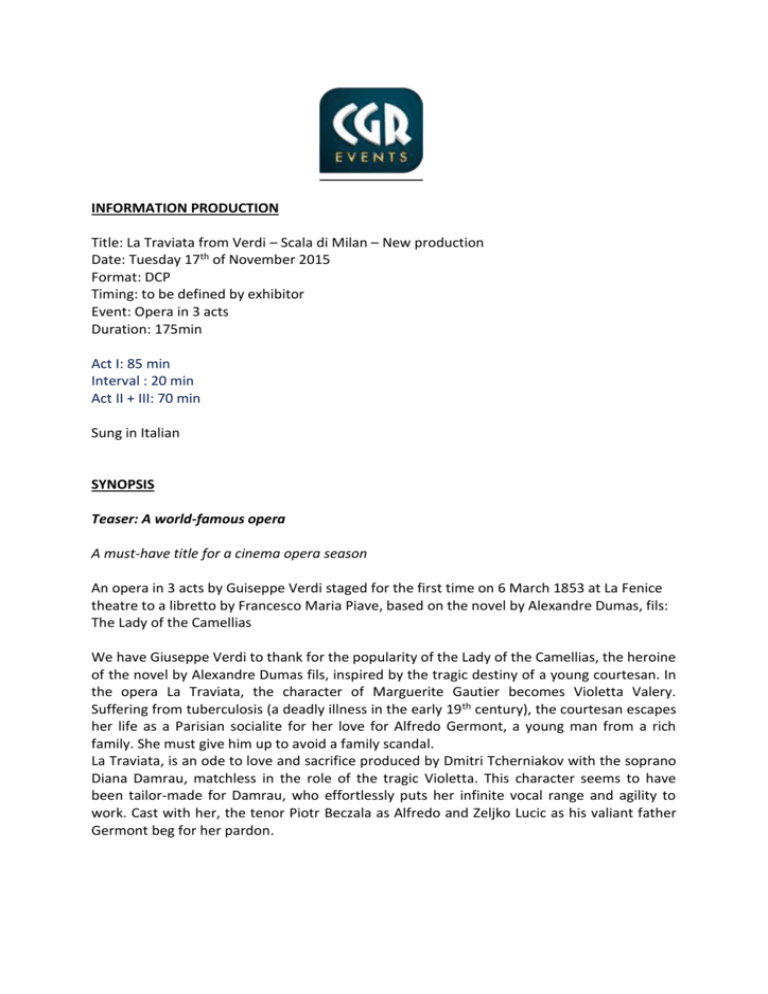
INFORMATION PRODUCTION Title: La Traviata from Verdi – Scala di Milan – New production Date: Tuesday 17th of November 2015 Format: DCP Timing: to be defined by exhibitor Event: Opera in 3 acts Duration: 175min Act I: 85 min Interval : 20 min Act II + III: 70 min Sung in Italian SYNOPSIS Teaser: A world-famous opera A must-have title for a cinema opera season An opera in 3 acts by Guiseppe Verdi staged for the first time on 6 March 1853 at La Fenice theatre to a libretto by Francesco Maria Piave, based on the novel by Alexandre Dumas, fils: The Lady of the Camellias We have Giuseppe Verdi to thank for the popularity of the Lady of the Camellias, the heroine of the novel by Alexandre Dumas fils, inspired by the tragic destiny of a young courtesan. In the opera La Traviata, the character of Marguerite Gautier becomes Violetta Valery. Suffering from tuberculosis (a deadly illness in the early 19 th century), the courtesan escapes her life as a Parisian socialite for her love for Alfredo Germont, a young man from a rich family. She must give him up to avoid a family scandal. La Traviata, is an ode to love and sacrifice produced by Dmitri Tcherniakov with the soprano Diana Damrau, matchless in the role of the tragic Violetta. This character seems to have been tailor-made for Damrau, who effortlessly puts her infinite vocal range and agility to work. Cast with her, the tenor Piotr Beczala as Alfredo and Zeljko Lucic as his valiant father Germont beg for her pardon. DISTRIBUTION: Conductor: Daniele Gatti, Director: Dmitri Tcherniakov. Violetta Valery: Diana Damrau Flora Bervoix: Giuseppina Piunti Annima: Mara Zampieri Alfredo Germont: Piotr Beczala Giorgio Germont: Željko Lučić The orchestra and chorus of La Scala. ARGUMENT The story “La Traviata” is without a doubt the finest musical marriage between France and Italy. It is Giuseppe Verdi’s most popular opera! The story unfolds in Paris in the 19th century and tells the story of the sad destiny of Violetta, a touching courtesan who dies of tuberculosis after having sacrificed herself to save the honour of her lover, Alfredo Germont. The opera is packed with grand arias, which are in turn heroic, stirring or moving, such as Violetta’s unforgettable “Addio del passato” or the mysterious Bacchanale chorus in act III. Act 1 Violetta Valéry, a courtesan admired by all, is giving a society event in her apartments. During the evening, one of the regular guests introduces her to Alfredo Germont, a young man who seems to show a deep interest in the mistress of the house. Proposing a toast, Alfredo seizes the opportunity to flatter Violetta, and they all drink to pleasure and love. Suddenly feeling unwell, Violetta asks to be left alone. While the guests are invited to dance in the adjoining room, Alfredo takes the opportunity to declare his love to Violetta. Touched, but disenchanted nevertheless, Violetta begs Alfredo to leave and gives him a camellia flower which he must bring back to her once wilted. Now alone, Violetta accepts that she is troubled by this young man who reawakens a shiver of happiness that she never expected to feel again. However, she sharply returns to reality and her position as a woman of the world, free, frivolous and hedonistic… Act 2 Scene 1: Violetta has admitted the strength of her love for Alfredo and is now living with him in her country house. Learning from Annina, the maid, that Violetta is selling her jewels to cover the couple’s expenditures, Alfredo decides to go to Paris to find the money they need. Giorgio Germont, Alfredo’s father, takes advantage of his son’s absence to visit Violetta. Accusing her of bringing dishonour on his son and the entire family, he asks Violetta to give up on her love for Alfredo. Understanding that her past has once again caught up with her, Violetta, heartbroken, gives in and sacrifices herself in the name of the one that she loves. While she prepares to write two letters – one that will mark a return to her former life, and one that will end her current relationship – Alfredo arrives. Deeply troubled, Violetta expresses the extent of her love for the last time before saying her goodbyes. Violetta leaves, calling out: “Love me Alfredo, love me as I love you”. Discovering Violetta’s letter, Alfredo cries out with despair, pushing his father and his advice aside and promising to get revenge… Scene 2: A party is in full swing at the home of Flora Bervoix, Violetta’s friend. Alfredo bursts in. Flora is surprised to see him alone, but then Violetta arrives, accompanied by Baron Douphol. Alfredo only has one wish: to get revenge. He plays cards with the baron and wins a large sum of money. Violetta is torn between a desire and the promise she made to Germont. She ends up pretending that she loves Douphol. Furious, Alfredo throws the money he has won in Violetta’s face before all of the guests, “paying” her for his three months of love. Violetta faints and the baron challenges Alfredo to a duel. Germont, who has followed his son, chastises him for insulting a woman in such a way. Act 3 Violetta, suffering more than ever has been abandoned by everyone. Only Annina has remained faithful to her. While outside Paris beats to the rhythm of Carnival, the doctor, on his daily house call, tells the maid that Violetta only has a few hours to live. Violetta rereads Germont’s letter, in which he tells her he has revealed everything to Alfredo and announces that Alfredo will be with her soon. Alfredo finally arrives and asks for Violetta’s forgiveness. Renewing their vows of love, the two lovers are already planning to leave Paris and live together in the happiness that was torn from them. While Germont begs Violetta’s forgiveness, she implores Alfredo to never forget her. A last surge of life seems to revive her, before she suddenly drops down, dead. HIGHLIGHTS OF THIS PRODUCTION // INFORMATION FOR THE AUDIENCE - One of opera’s most beloved and popular titles Whether you are crazy about opera, or indifferent to this particular art form, you cannot ignore La Traviata, Verdi’s most sublime composition. Verdi always strove to move his listeners, whatever their culture, nationality or social status. - Diana Damrau – One of the best contemporary Violettas The other attraction of this Verdi opera is its vocal interest. Diana Damrau, the soprano, literally triumphs in the role of Violetta, so much so that the press gave her rave reviews, noting in particular an “unequalled intelligence” and a “faultless veracity”. “Anyone who thinks of a German soprano virtuoso will now think of Diana Damrau”. Impeccable technique, grace and clarity of timbre are her strong points. The singer shows herself to be capable of injecting irresistible sympathy into the part, thanks to her slightly whimsical personality. - An opera that is accessible to everyone Three short, dense acts superbly put together and without the slightest excess, perfectly structured. - A universal theme: love “It is Verdi and his Traviata that gave style to The Lady of the Camellias.” Marcel Proust COMMUNICATION ASSETS Posters (print/web) Trailer Argument – cast sheet
